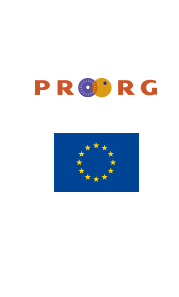Pro-Org
DEVELOPING A CODE OF PRACTICE FOR ORGANIC FOOD PROCESSING
CONTACT
Christophe Cotillon (Actia)
Tel. : 33 (0)6 14 08 91 41
COORDINATION
Crea (Italy)
Partners
Fourteen partners representing 6 different European Countries and Switzerland: Danemark (University of Copenhagen-KU), France (The French Network of Food Technology Institutes-Actia, National Institute of Agronomic Research-Inra, Tecnical Institut for Organic Agriculture-Itab), Germany (Thuenen Institut-TI, FH Münster University of Applied Sciences-FH MU, Assoziation Ökologischer Lebensmittelhersteller-AÖL), Italy (Consiglio per la ricerca in agricoltura e l’analisi dell’economia agraria-Crea, Università politecnica delle marche-UNIVPM, Associazione nazionale delle imprese di trasformazione e distribuzione di prodotti biologici e naturali-Assobio), Poland (Warsaw University of Life Sciences-Wuls), Switzerland (Forschungsinstitut für biologischen Landbau-FiBL), The Netherland (Wageningen University &If funded Research-Wur).
The Hungarian Research Institute of Organic Agriculture (ÖMKi, H) takes part in the project as external partner. Stakeholders from Italy, Denmark, Germany, Netherlands, France, Poland, Norway, Bulgaria, Estonia, Latvia, Sweden and Slovakia are involved.
BEGINNING OF PROJECT
April 2018
DURATION
36 months
Reference
Objectives
The organic food market is one of the fastest growing food sector in the world. A major part of the organic food consumed is processed. Therefore, the increasing demand of organic food represents a major challenge for the organic food industry.
With the exclusion of a positive list of additives and technological aids, mandatory standards for the processing of organic food are lacking in the European Regulation, as well as indications that can represent a guide for the processors in the selection of appropriate technologies and innovations in line with the organic principles.
To contribute to the sustainable innovation in the organic food sector, the project has the objective to develop a flexible and practicable Code of Practice (CoP) for processors of organic foods, as well as labelling organizations. The CoP aims to provide the operators with strategies and tools for making decisions that can help them to take the best choice for careful processing methods and formulations with a limited use of additives, while addressing the organic principles, high food quality, low environmental impact and high degree of consumer acceptance. To labelling organizations, the CoP will provide an assessment and decision support tool to evaluate the compliance of process innovations with the general organic principles.
The project builds on a participatory design and involves experts from different scientific disciplines, representatives of processors, traders, labelling organizations and other relevant stakeholders, as well as individual companies. The development of the CoP will be based on an iterative process in which the CoP will be tested at industry and retail level by case studies and a market survey, supported with scientific experiments and analytical determinations, to define the final version. Studies will be performed to identify consumer preferences and acceptance of processing technologies of organic food. A dissemination plan completes the project.
Actions




